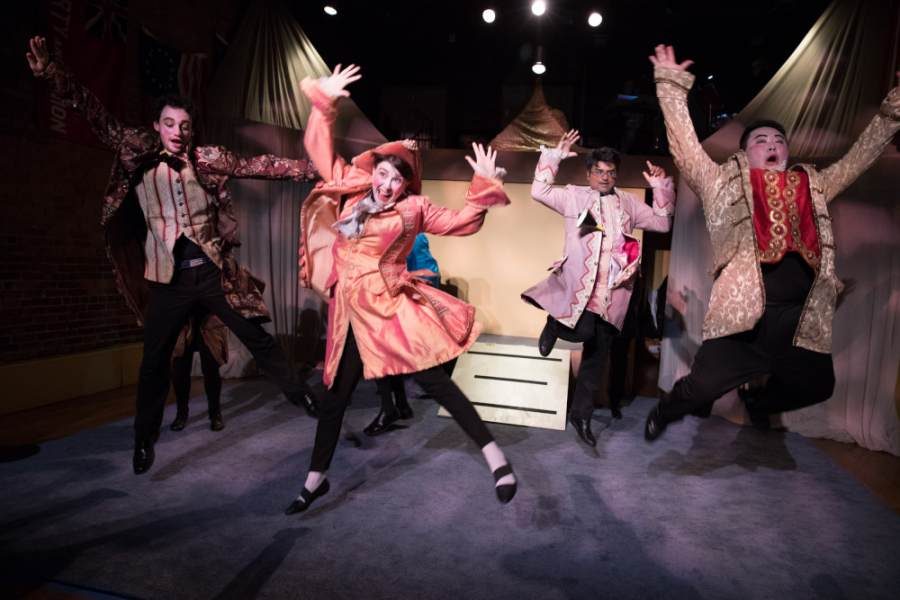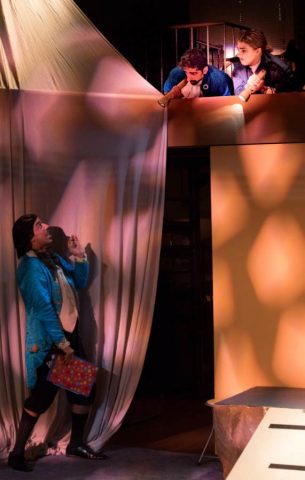

Despite being one of the first plays ever written in America, Robert Hunter's Androboros: Villain of the State has never been performed on a stage. That is, not until just last year, when director Ralph Lewis brought an adapted version of Hunter's 1714 play to the Overthrow boxing ring for a sold-out, three-night workshop. Now, with his partners at Peculiar Works Project, Lewis is staging another site-specific production of Androboros inside Fraunces Tavern Museum. We caught up with the director to talk politics, humor, and -- as always -- theatre.
How did you discover this play and what attracted you to it as a director?
Well, my dramaturg Barbara [Yoshida], years back, had given me this book called Before and Behind the Curtain, written in 1853. And it was all about how, “Wow, theatre is changing so much! My dear reader, you just have to know what’s going on in Manhattan with these theatres!” And I thought, oh my god, I hear that every three to five years in our community. I had to find out what this guy was talking about. And it sent me back on a journey to what were the first theatres in Manhattan, in New York, and really pretty much in the United States: the Nassau Street Theatre, the John Street theatre, the Park Theatre. So I developed a talk about these theatres, and in the research for the talk I had to go back and find out, well what were the first plays in America? And the main one I could find was something called Ye Bare and Ye Cubb. It was done in the Williamsburg Colony and the only reason we know about it is the guys that put it on were arrested and brought to trial, and the judge let them go because he thought the play was just so bad. But no copy of that play exists. So I went to the next play and it was Androboros. And I could actually find a copy of that. And the writing is very dense, but I really researched it and learned to know the play, and I thought, oh my god, this is a really funny play if people sort of knew what it was saying. And so Barbara and I set about adapting it.
Androboros is staged inside Fraunces Tavern Museum, and you’ve directed several site-specific productions. But the one I’m most curious about is Bowery Whole Foods.
We teach a site-specific class for La MaMa every fall, and we work all semester with the students to develop pieces of their own. So we do a promenade performance with them, and I live on the Bowery in a 200-year-old Federal style house (so I have an interest in old things beyond theatre). So I went up to the Whole Foods and I talked to them and I said, “Hey, can we do a show in your grocery store?” And they were open to the idea. So the students, they did put on this show where the audience could follow from piece to piece to piece. Or, you know, people would just be shopping in one of the aisles and all of a sudden one of the actresses would start talking about peanut butter and body issues. It was surprising to a lot of the patrons at Whole Foods, and also our audience was there as well. So it was a unique combination.
What do you like about site-specific theatre?
Well, I tell people, “We don’t just build the set and hang the lights. We build the backstage, we build the box office, we build the dressing rooms, we build the audience seating.” So it’s a lot of work, so right now my body is just so tired from building the show that (laughs) I’m not really sure what I like about it.
But you know, as an actor in my younger days I was really frustrated by being put in front of some black velvet curtains, some black cubes, in a black outfit, and then expecting to do my best work. It didn’t matter how good of an actor I was you just cannot excite an audience that way. And we were – my partners Barry [Rowell], Catherine [Porter], and I – coming up in the age of En Garde Arts. We all had some interaction with that company and they were a big inspiration -- Anne Hamburger was a big inspiration to us. At the time, there were a lot of vacant spaces in our neighborhood that just had For Rent signs on them. We couldn’t afford to rent a theatre when we started out 24 years ago, and we thought, “Hey, let’s just see if they’ll let us use that space for a month, and we’ll put our own lights in there!” Burned out warehouses, dirty, grungy basements. And then we also ended up in places like the Greenwich House Music School, which is another landmark building, or the old Merchant’s House Museum. So we’ve worked in those really grungy places and also very delicate, pristine places. Just the idea of giving an audience an opportunity to experience theatre in a different sort of way: just something to sort of shake it up, make it new, make audiences – not just blindly walk through it, see the show and walk back out, but to somehow give them a little more experience, cultural experience, with their theatre experience. Our work is very multidisciplinary, we often have live music and dance and visual arts and projections and things with our productions. So the site in which we do the plays is just another part of our multidisciplinary experience.

Androboros is a very funny play. But at the same time, it raises some serious political problems. What do you see as the role of humor in working through political issues?
Well, you know, we’re trying not to hammer people too much over the head with anything. But we do have a theory that what makes an artwork good is having something worthwhile to say, and an engaging way to say it: you’ve got to have that combination of those two things. So while we’re trying to have something important to say about how we participate or don’t participate in our political process, and how much, you know, OK, we have to deal with Trump now – but don’t get all sad and crying about it. We have been through bigger idiots than him even though we don’t often go into the history to realize that. P. T. Barnum was a congressman at one point. So this is not new, and the important thing to say is we’ll get through this. We just have to all be involved to the extent to which we can be involved. But if that’s all you say, the audience can more easily turn off. So we try to use humor as a way to open audiences up to be able to receive a point of view without feeling like it’s being drummed into them. So comedy I think is very important to getting across a political message, or any kind of important message. And it is just a funny play.
Do you feel you’ve gained any insight, or fresh perspective, into American or just New York politics through directing this play?
Well certainly I feel a certain sense of comfort that we are going to survive what we’re going through now. I actually was very surprised that this man had written this play when the country was just starting out. You think gridlock is a new invention and it’s like, no, we’ve always struggled politically with people trying to serve themselves versus serving their community or their constituency. So I think that I’ve learned a lot about that push and pull, that give and take between the personal and the public in terms of how we rule ourselves or how we consent to allow other people to take the lead. And it’s very hard cause you want things your way, but if everyone has things their own specific way we’ll never get along. Somehow we have to agree to work together or this is just never going to work out.
Robert Hunter -- I find him a very fascinating individual because he was a military guy, he was also a government type person, but he was also a published writer well before he ever came to the United States. So he was a very good writer in addition to the other things he did. And the play that he’s written -- I find it very fascinating in the sense that it is a combination of Elizabethan: it has Shakespearean influences in it. And it also has a lot of Italian commedia dell’arte, which was all the rage throughout Europe at the time. Here he’s sort of blended two styles, so some of the Elizabethan language, like a Shakespeare play, kind of washes over you, and then the commedia dell’arte is just right there on the surface, you know, poopy jokes and pratfalls. So I found it very fascinating. And structurally he’s put together something that is kind of complex. I don’t think in indie theatre that often you’re going to find a cast this large, with live music, with dancing. And shows like that take a couple of weeks to find their place. So I think this play is going to be a lot different two weeks from now than it was last night, even though the actors have just done terrific work and it's really exciting to see them get out there and make 'em laugh.